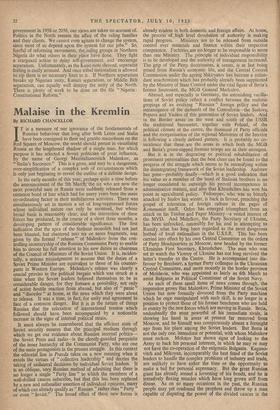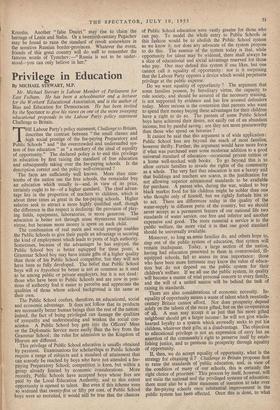Malaise in the Kremlin
By RICHARD CHANCELLOR IT is a measure of our ignorance of the fundamentals of Russian behaviour that long after both Lenin and Stalin have been consigned to their red granite mausoleum on the Red Square of Moscow, the world should persist in visualising Russia as the lengthened shadow of a single man, for which purpose it has selected a Soviet politician of great influence, by the name of Georgi Maximilianovitch Malenkov, as " Stalin's Successor." This is a gross, and may be a dangerous, over-simplification of a complex web of circumstances which is only just beginning to reveal the outline of a definite design.
In the early months of this' year, perhaps quite a time before the announcement of the 5th March, the six who are now the most powerful men in Russia were suddenly released from a common bond of fear which had for many years been the main co-ordinating factor in their multifarious activities. There was simultaneously set in motion a set of long-suppressed forces, whose individual nature can only be surmised, but whose broad basis is reasonably clear, and the interaction of these forces has produced, in the course of a short three months, a developing pattern of considerable significance. The first indication that the apex of the Stalinist monolith had not just been blunted, but shattered into six or more fragments, was given by the formal " release " of Malenkov from the con- trolling secretaryship of the Russian Communist Party to enable him to devote his full attention to his new duties as chairman of the Council of Ministers of the Soviet Union. It is, inciden- tally, a serious misjudgement to assume that the duties of a Soviet Prime Minister are equivalent to those of his counter- parts in Western Europe. Malenkov's release was clearly a crucial proviso in the political bargain which was struck at a time when the Soviet leaders believed themselves to be in considerable danger, for they foresaw a possibility, not only of active hostile reaction from abroad, but also of " panic ' and " disorder " at home, at the news which they were about to release. It was a time, in fact, for unity and agreement in face of a common danger. But it is in the nature of things Russian that the relaxation of international tension which followed should have- been accompanied by a noticeable increase in the signs of internal political strain.
It must always be remembered that the efficient state of Soviet security ensures that the principal medium through which we get our evidence about Russian internal politics-- the Soviet Press and radio—is the closely-guaided perquisite of the inner hierarchy of the Communist Party, who are one of the main protagonists in the present struggle. In this context the editorial line in Pravda takes on a, new meaning when it extols the virtues of " collective leadership " and decries the taking, of unilateral decisions by individual Soviet leaders. It is an oblique, very Russian method of admitting that there is no longer a single " Party line " to which the members of a well-drilled caucus subscribe, but that this has been replaced by a new and unfamiliar assertion of individual opinions, many of which can already qualify as " Russian " rather than " Party ' or even " Soviet." The broad effect of these new forces is already evident in both domestic and foreign affairs. At home, the process of high level devolution of authority is making rapid progress. Ministers are to be released from outside control over materials and finance within their respective competence. Factories are no longer to be responsible to more than one Ministry. The principle of individual responsibility is to be developed and the authority of management increased. The grip of the Party doctrinaires, it seems, is at last being prised from Russia's economic life, and the Central Control Commission under the ageing Shkiryatov has become a redun- dant anachronism which has probably already been supplanted by the Ministry of State Control under the vital figure of Beria's former lieutenant, the MGB General Merkulov.
Abroad, and especially in Gerniany, the astonishing vacilla- tions of Soviet policy reflect a conflict between the realistic gropings of an evolving " Russian " foreign policy and the intransigence of the diehards of the Cominform—the Suslovs, Popovs and Yudins of this generation of Soviet leaders. And in the Border areas on the west and south of the ,USSR the traditional barometer, together with Poland, of the political climate at the centre, the dismissal of Party officials and the reorganisation of the regional Ministries of the Interior is following a clearly defined pattern. It is probably no co- incidence that these .are the areas in which both the MGB and Beria's green-capped frontier troops are at their strongest. But it is in the disgracing or political rehabilitation of prominent personalities that the best clues can be found to the progress of the struggle which seems to be intensifying within the disintegrating framework of the Soviet leadership. Andreev has gone—probably finally—which is a good indication that his value as a member of the band of Stalinist brothers is no longer considered to outweigh his proved incompetence in administrative matters, and also that Khrushchev has won his point in agricultural policy. Fedoseyev, who was so bitterly attacked by Suslov last winter, is back in favour, preaching the gospel of toleration of foreign culture in the pages of Kommunist itself. Orlov has emerged triumphant from an attack on his Timber and Paper Ministry—a vested interest of the MVD. And Melnikov, the Party Secretary of Ukraine, has been unfrocked, ostensibly for his zeal in attempting to Russify what has long been regarded as the most dangerous hotbed of local nationalism in the U.S.S.R. This has been carried into effect by his own Central Committee on the orders of Party Headquarters in Moscow, now headed by the former Ukrainian First Secretary, Khrushchev. The man who was set to watch the Viceroy of Ukraine has not long survived the latter's transfer to the Centre. He is accompanied into dis- favour by Brezhnev, a former Party colleague in the Ukrainian Central Committee, and more recently in the border province of Moldavia, who was appointed as lately as 6th March to assist Bulganin as Political Commissar of the Soviet Navy. As each of these small items of news comes through, the impression grows that Malenkov, Prime Minister of the Soviet Union but now formally divorced from the Party machine which he once manipulated with such skill, is no longer in a position to protect those of his former henchmen who are held in enmity by the new forces which are moving in Russia. Beria, undoubtedly the niost powerful of his immediate rivals, is showing his hand in areas at present far removed from Moscow, and he himself was conspicuously absent a fortnight ago from his place among the Soviet leaders. But Beria in not the only one, immediate or potential, with whom Malenkov must reckon. Molotov has shown signs of looking to the Army to back his personal interests, in which he may or may not have the co-operation of the enigmatic Bulganin. Kagano- vitch and Mikoyan, incomparably the best fitted of the Soviet leaders to handle the complex problems of industry and trade, are unlikely to have either the time or the opportunity to make a bid for personal supremacy. But the great Russian giant has already sensed a loosening of his bonds, and he is tentatively flexing muscles which have long grown stiff from disuse. As on so many occasions in the past, the Russian people may yet confound the prophets and throw up a man capable of disputing the power of the divided caucus in the Kremlin. Another " false Dmitri " may rise to claim the heritage of Lenin and Stalin. Or a twentieth-century Pugachev may be found to raise the standard of revolt somewhere in the sensitive Russian border-provinces. Whatever the event, friends of this great country will do well to remember the famous words of Tyutchev :—" Russia is not to be under- stood—you can only believe in her."



































 Previous page
Previous page